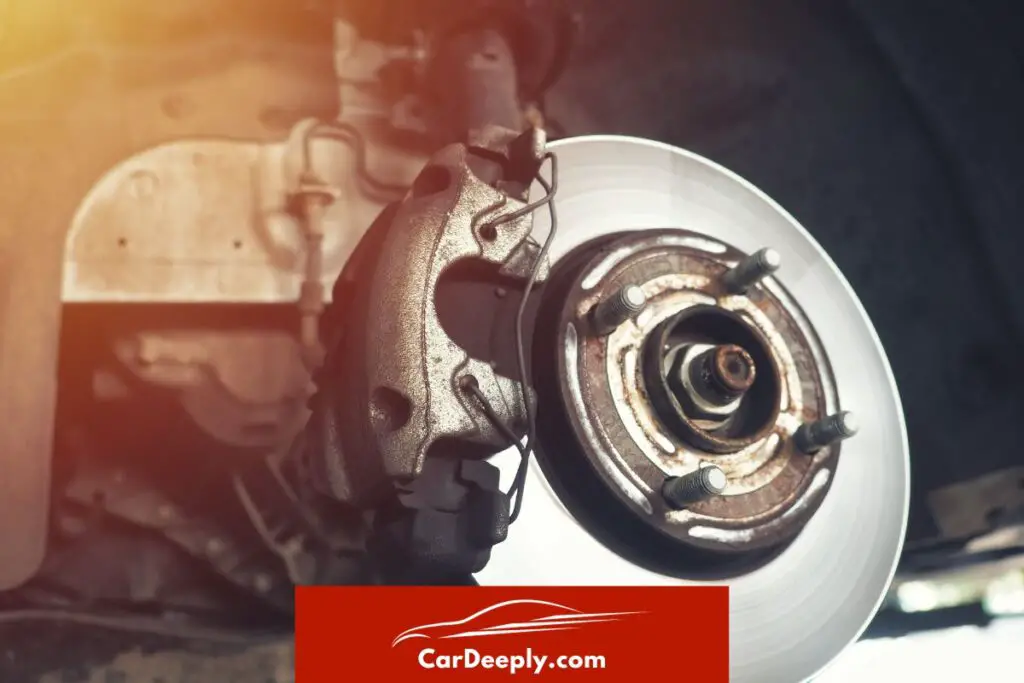Understanding heavy-duty brakes is essential for every vehicle owner.
There are a lot of things to know about heavy duty brakes, and by coming here, you are in for a treat.
In this article, you will learn about the key differences between standard and heavy-duty brakes, get practical tips to determine your vehicle’s brake type and receive expert advice on maintaining and optimizing brake performance.
Advertising links are marked with *. We receive a small commission on sales, nothing changes for you.
Key Takeaways

- Heavy-duty brakes offer enhanced safety and performance, especially for towing.
- Regular inspections and maintenance prolong brake lifespan.
- Vehicle model, engine, and driving conditions influence brake choice.
- Myths about brakes, like “bigger is always better,” can be misleading.
- Both standard and heavy-duty brakes require attention and care for optimal function.
Understanding Heavy-Duty Brakes
What are Heavy-Duty Brakes?
Heavy-duty brakes, as the name suggests, are designed for vehicles that require enhanced stopping power. These brakes are not just a luxury but a necessity for specific vehicles, especially those that frequently tow heavy loads or operate in demanding conditions.
- Rotor Thickness: One of the primary distinctions of heavy-duty brakes is the thickness of the brake rotors. Standard brakes might have around 12mm thick rotors, while heavy-duty variants can go up to 14mm or even more.
- Size Matters: The overall size of heavy-duty brakes is generally larger. This increased size allows for better heat dissipation, ensuring the brakes remain effective even under intense usage.
- Vented vs. Solid Rotors: While many standard brakes use solid rotors, heavy-duty brakes often employ vented rotors. These vents help in cooling the brakes faster, reducing the chances of brake fade during prolonged use.
Importance of Heavy-Duty Brakes in Vehicles
The significance of heavy-duty brakes goes beyond just stopping a vehicle. It’s about safety, performance, and peace of mind.
- Safety Implications: Vehicles equipped with heavy-duty brakes have a shorter stopping distance. This can be crucial in emergencies, reducing the risk of accidents. For instance, a truck towing a 3-ton trailer requires more stopping power than a regular sedan.
- Enhanced Performance for Towing and Heavy Loads: If you’re towing a boat, trailer, or carrying heavy equipment, standard brakes might not cut it. Heavy-duty brakes ensure the vehicle remains stable and can stop effectively, even with the added weight. There are more things to add into consideration, for example, the engine – find out which F150 engine is the best for towing. If that specific model has a heavy duty brakes – you have a perfect match. Consider a scenario where you’re descending a steep hill with a loaded trailer; in such cases, the importance of these brakes becomes even more evident.
Identifying Heavy-Duty Brakes in Your Vehicle
Recognizing if your vehicle is equipped with heavy-duty brakes can save you time, money, and potential hazards. Here’s how you can identify them:
- Physical Examination: Start by checking the size and thickness of the brake rotors. As mentioned, heavy-duty brakes often have thicker and larger rotors. Also, look for rotor vents, a common feature in heavy-duty variants.
- VIN and Code List Checks: Your Vehicle Identification Number (VIN) can provide information. Cross-referencing your VIN with manufacturer code lists lets you determine the type of brakes your vehicle was initially equipped with.
- Consult Your Mechanic: If in doubt, consulting with a professional is always a good idea. They can quickly and accurately determine the type of brakes in your vehicle.
In conclusion, understanding the nuances of heavy-duty brakes is not just about knowledge; it’s about ensuring safety and optimal performance. Knowing your vehicle’s braking system can make all the difference, whether you’re a daily commuter or frequently tow heavy loads.
Practical Insights and Tips
When to Consider Upgrading to Heavy-Duty Brakes
The decision to upgrade to heavy-duty brakes isn’t one to be taken lightly. It’s an investment in safety and performance. When should you consider making the switch?
- Towing Requirements: If you find yourself frequently towing heavy loads, such as boats, trailers, or machinery, it’s a clear sign. Remember, a vehicle towing a 2-ton load requires significantly more stopping power than when it’s unladen.
- Vehicle Model and Engine Considerations: Some high-performance vehicles or trucks with larger engines naturally demand better braking systems. If you’ve upgraded your vehicle’s engine or overall performance, it’s time to consider the brakes too.
- Driving Conditions: Regularly driving in hilly terrains or areas that require frequent stops can wear out standard brakes faster. Heavy-duty brakes can offer more extended durability and better performance in such scenarios.
Maintenance Tips for Heavy-Duty Brakes
Maintaining your heavy-duty brakes ensures they function optimally and last longer. Here are some practical tips:
- Regular Inspections: Have your brakes checked by a professional at least twice a year. They can identify signs of wear and tear before they become significant issues.
- Recognize Signs of Wear: Listen for unusual noises when braking, feel for vibrations in the brake pedal or notice if the vehicle pulls to one side when braking. These can be indicators that your brakes need attention.
- Use Quality Brake Fluid: Brake fluid plays a crucial role in the braking system. Ensure you use high-quality fluid and check its levels regularly.
Common Myths and Misconceptions
The world of brakes isn’t free from myths and misconceptions. Let’s debunk some of them:
- Bigger is Always Better: While heavy-duty brakes are larger, it doesn’t mean they’re suitable for all vehicles. Choosing brakes that match your vehicle’s specifications and driving needs is essential.
- Heavy-Duty Brakes Last Forever: No brake system lasts indefinitely. Even the most robust heavy-duty brakes require regular maintenance and eventual replacement.
- All Brake Noises Indicate a Problem: While some noises can signify wear, not all sounds are problematic. Occasional squeaks can be due to factors like moisture or dust. However, persistent noises should be checked.
In wrapping up this section, remember that understanding and maintaining your vehicle’s braking system is paramount. We think that whether you opt for standard or heavy-duty brakes, regular care and attention can ensure safety on the road and a smoother driving experience.
Frequently Asked Questions (FAQs)
What’s the cost difference between standard and heavy-duty brakes?
While heavy-duty brakes tend to be more expensive than standard ones due to their enhanced features and durability, the exact cost can vary based on the vehicle model, brand, and where you purchase them. However, considering the safety implications and performance benefits, many find the investment worthwhile.
How often should heavy-duty brakes be replaced compared to standard brakes?
Heavy-duty brakes are designed for durability, especially under strenuous conditions. While they might last longer than standard brakes, their lifespan depends on usage, driving conditions, and maintenance. Regular inspections can help determine replacement needs.
Are there any specific driving habits that can prolong the life of heavy-duty brakes?
Absolutely! Avoiding sudden stops, not overloading the vehicle, and ensuring regular maintenance checks can prolong the life of your brakes. Also, using engine braking in hilly terrains can reduce wear on the brake system.
Can I switch back to standard brakes after using heavy-duty ones?
Yes, you can switch back to standard brakes. However, if your vehicle’s conditions or your driving habits demand heavy-duty brakes, changing back might compromise safety and performance.
Do heavy-duty brakes affect fuel efficiency?
While the primary function of brakes is safety, the type of brakes can have a minimal impact on fuel efficiency. Due to their size and design, heavy-duty brakes might slightly affect fuel consumption, but the difference is often negligible.

Luna Meschiari is a full-blooded car nut who is well known to local garages, as each article is meticulously researched and peppered with the latest piece of information. Guess what car she’s driving right now? A RAV4 2021 Hybrid. But her heart also sleeps for pickups like the F-150. Get to know Luna better on the about us page.
Advertising links are marked with *. We receive a small commission on sales, nothing changes for you.
